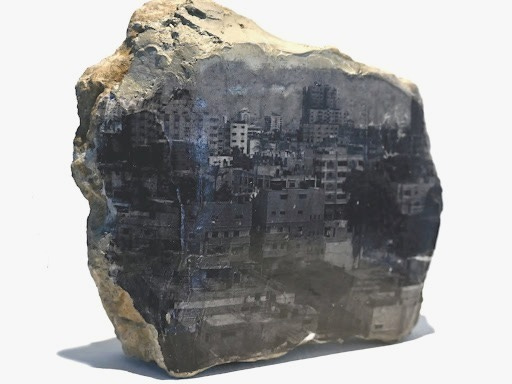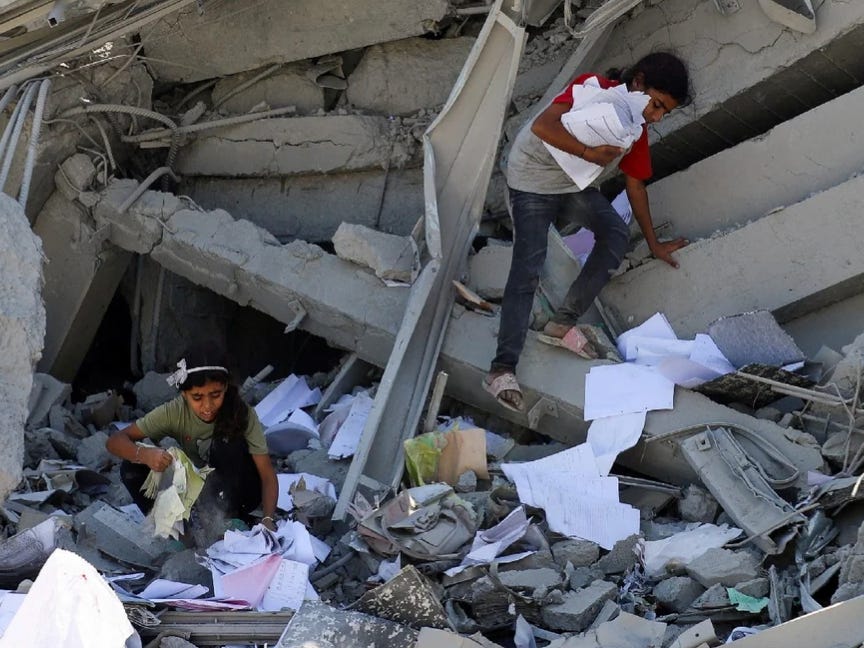Palestine has made radical solidarities possible
By Bhakti Shringarpure. The naked asymmetry of the Gaza ceasefire plan and a conversation on hope and solidarity with writer Sisonke Msimang traversing Australia, South Africa and Palestine

The Gaza ceasefire plan shocks and scathes, and makes clear that peace only means more war. Masterminded by brutes who lord over tyrannical regimes — Israel and the US — it is a raw deal of epic proportions. The terms of it are so grotesquely unfair and so reeking in threats that the promise of future violence is ominous, even palpable.
For now, these false promises offer a small window of time, and has given Palestinians much needed room to breathe. But not much else. The marches of return have begun, and scenes of joy at beautiful reunions are punctuated by scenes of Gazans seeing their homes, families and neighborhoods ground to dust. Aid is deliberately slow to trickle in, painfully and deliberately, held up and inspected at checkpoints.
As with everything else, the Palestinian-Israeli hostage exchange has a naked asymmetry. It has always been the case: hundreds of Palestinians for one Israeli. This time, it will be 20 Israelis for 2000 Palestinians in round one. This sick math of human lives is calculated openly and is consensual. Over 10,000 Palestinians hostages that includes children will not be part of the exchange. These are Palestinians kidnapped and imprisoned without being charged, without any trial; mistreated, tortured and starved, entire childhoods and youths lost, lives broken beyond repair.
This calculus of human lives is so asymmetrical and so plainly racist — the hundreds of Palestinians for the price of one Israeli — that the pure injustice and the proper colonialism of it is undeniable. Yet, one pretends this is a “deal” and this is “fair” and that this is “peace” even when it does not allow for Palestinians to play any part in governing themselves. There are also elements in this plan that would be outright hilarious if the price was not being paid in actual lives. It demands “deradicalization” of Gaza so it can be a “terror-free zone.” This is laughable coming from Israel and the US, the two most radicalized, religious fundamentalist countries in the world. These are also two countries, weaponized to the gills, who wreak unspeakable terror upon the world.
At the core of it all is genocide denial. And genocide denial is an important ideological pillar to allow the genocide of the colonized Palestinian people to continue just as it has been for over a hundred years now. Slow or fast, gradually or forcefully, the erasure of lives, culture and history remains a singular mission.
But there are signs of hope. At the last minute, Israel refused to release key political prisoners, Marwad Barghouti being the most prominent among them. They also refused to release Dr. Hussam Abu Safiya, the most well known of Israel’s many abducted health workers. It is heartening to see the fear that these powerful brilliant men strike in the hearts of the Israelis. It is a sign that Palestinian resistance remains ever potent and ever strong.
Hope was also a thread in my conversation with South African writer and activist Sisonke Msimang who joined me from Australia. Sisonke spoke about how the last two years of genocide has been received, and has shown how much the world cares about “the preciousness of white life.” She said that “we often talk about how Black lives matter, but I’m deeply interested in how much white life is prized.” She is right, of course, and the naked asymmetry of the Palestinian-Israeli hostage exchange, the bias in media narratives, the deep regard for white lives surrounds us, erodes us, haunts us.
But Palestine has made radical solidarities possible. In Australia, Sisonke says, the genocide has brought Indigenous and Palestinian groups together, and mass mobilizations have started to take shape. Given the high levels of Islamophobia, and anti-Indigenous and anti-Black sentiment in the country, there is now “a real feeling amongst groups, at a community level, of folks who are othered by this settler colony, that we see each other and that we are very much in solidarity.”
Additionally, she also notes that there an “upswell in radical media” with new podcasts, substacks and writing initiatives popping up, speaking back to mainstream Australian politics.
Sisonke locates herself in many places, and can speak fluently and eloquently from and about them but she is clear that she is, first and foremost, an African.
“Despite the fact that Africa is not a country, I experience myself, I feel myself, to be African,” she tells me. Sisonke was born to South African activist parents and grew up “a child of the freedom struggle.” Even though she moved around a lot, Sisonke feels at home in many countries and continents, as well as within the global Black diaspora.
South Africa, however, remains a political and intellectual anchor. By the time she finished university there, “freedom was on its way,” and for Black South Africans, the challenge of building the country was monumental. After working in development and human rights organizations for several years, Sisonke experienced a “loss of faith in what international institutions could do, and what it meant to use the language of human rights.” The gap between what was promised on paper and in charters and the reality of the state’s conduct felt “viscerally clear.” She turned to writing to articulate these precise concerns, and to make sense of “a moment in which the promise of freedom and the promise of the liberation struggle was beginning to fade.”
Sisonke is the author of two books and dozens of essays and articles, all of which are deeply political and incisive works of cultural criticism centering Black women, race and racism, and Africa. Palestine has also been central to Sisonke’s writing, engagement and activism. She believes that progressive South Africans have instinctive solidarity for Palestine because they, too, have experienced apartheid and occupation.
“The parallel struggles between our people are impossible to ignore,” she says.
Yet questions of solidarity and the precise shape of political activism and engagement have also come under strain in an attention economy that is miserly and quick to devolve into a virtue signaling circus.
“I try very hard to remember, and to be rooted in what activism felt and looked like before we lived online,” she says when asked about why we choose to focus on some struggles and not others; why Palestine and why not Sudan or Congo? Before the times of social media and online activism, “there was no requirement, no capacity to be an activist on all issues at one time, nor was there a sense that you were somehow a lesser person, you were somehow less committed to social justice or to activism.”
Online activism creates a double bind because it functions as a “kind of panopticon,” according to Sisonke; there comes about a “surveillance of activism as performance.” It forces a politics of gesture that is preoccupied with visibility. “One can both seem to be more engaged than one actually is because of social media and because of what’s visible. And then one can also be assumed to be less involved and engaged…in ways that are not seen and not known to others on Sudan or Congo, simply because one is posting about Palestine.”
“What might be the role of the writer today?” I ask. Sisonke believes that everyone, and not just the writer, should be on “the front lines of fighting for justice.” But she is aware that it is particularly hard when there is a genocide being carried out, and when those very forces “have the power to silence you and to punish you for speaking up against that genocide.”
“It’s both more important and more difficult than ever to just be a human in this time,” she says. “So, I think the role of the writer is no special or no different from the role of anybody else. It is to show up and to speak the truth about what it is that you see.”
Some days, the bastion of white supremacist colonialism might appear stronger than ever. But it is crumbling inside because it has become indefensible. There has been a collective epiphany. And that click, that realization about just how unjust and cruel it all is, that swell of rage and protest, and that hunger for justice that Palestine has ushered cannot be quelled. Empire will fall.
Love and solidarity❤️🔥
Bhakti Shringarpure




